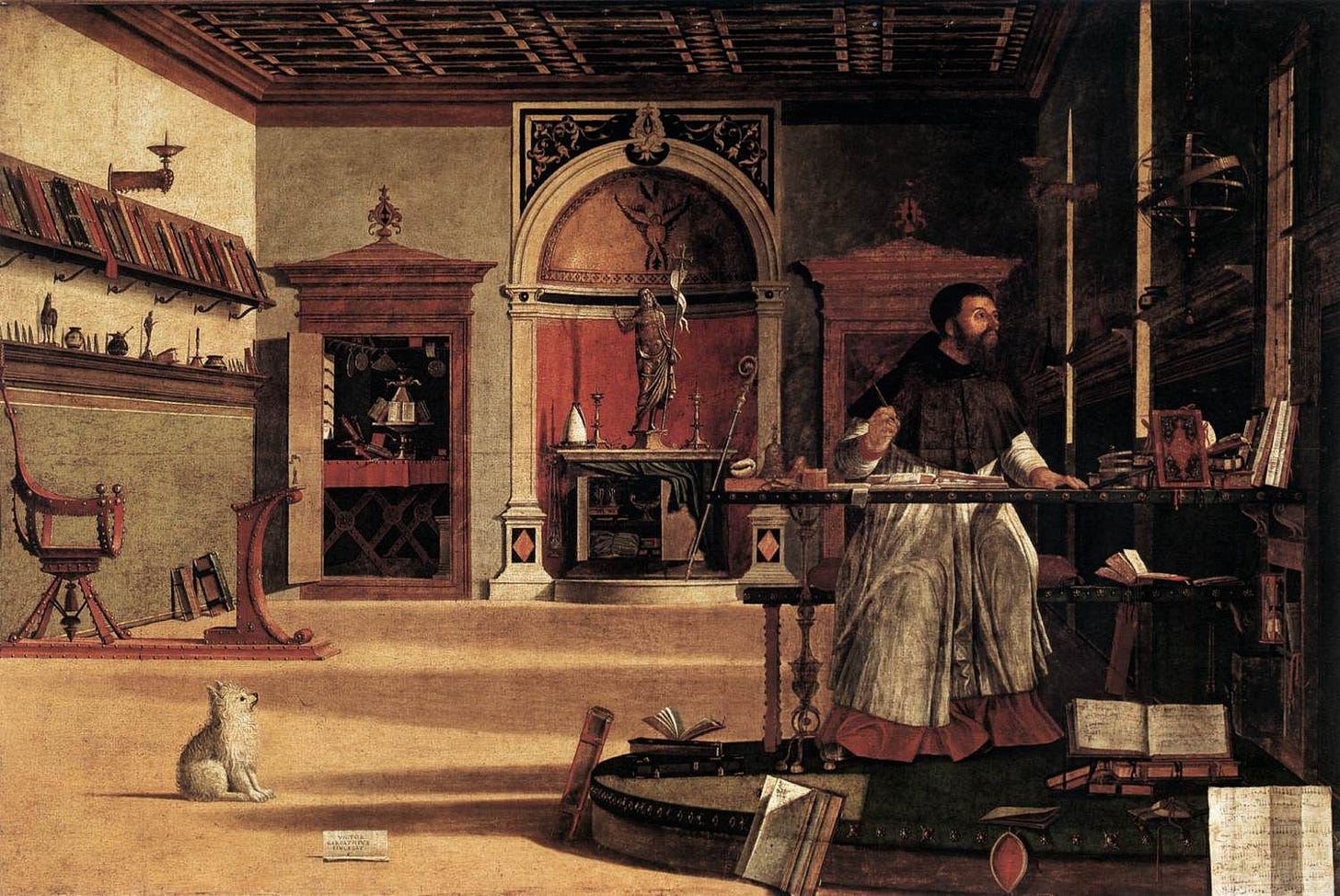St. Augustine's Secret to Overcoming Temptation
The divided will and why you keep falling into sin.
It can be quite heartbreaking to confess the same sin over and over again, trying our hardest to break free only to find out that the temptations of the world continue to defeat us.
You probably know how it is: you pray for strength, join accountability groups, read books on purity, make resolutions, delete apps, and promise God, once again, that this time you will really try your hardest.
And then you fall again.
The battle against sexual sin can be discouraging, as we realize the sometimes overwhelming strength of our foe. But we can find comfort in knowing that many great saints have fought the same battle, and look towards them for advice.
Most notably, St. Augustine in his Confessions details his intense struggle against the temptations of his former life, and his testimony serves as a reminder that no matter how powerful the enemy is, God’s grace is even greater.
What we learn from St. Augustine is that you won’t break free from the temptations of lust if you keep fighting the wrong battle and try to force yourself to stop doing things that deep down you still want to do. You’re asking God to help you resist temptation while secretly hoping He’ll let you indulge just one more time.
St. Augustine knew this trap intimately. This is what’s called “the divided will”, and understanding it can be the key to finally defeating the vices that still enslave you.
St. Augustine’s Struggle
St. Augustine was already recognized as a brilliant thinker and rhetorician from an early age. His status in the history books, as well as his role in the development of Christian doctrine speak to his incredible wisdom and his profound faith. We all know he was a genius, but what many don’t know is that he was a man who struggled deeply —and I mean deeply—, against sexual temptation.
From around age 16, he describes his ongoing battle with lust:
This was the age at which the frenzy gripped me and I surrendered myself entirely to lust, which your law forbids but human hearts are not ashamed to sanction.
Until well into his thirties, St. Augustine lived enslaved by sexual sin: he was trapped in lust, spiritually tormented, and living with a mistress. And yet, he was a man who deeply longed for God’s comfort, even while trapped in this seemingly endless cycle of sin.
He knew it was destroying him. He knew God was calling him to something higher. And yet, night after night, he returned to the same sin, the same emptiness, the same shame. His mother Monica prayed fervently for his conversion, his friend Ambrose preached the truth to him with power and Augustine himself longed for freedom, for purity, for God and His deliverance.
The Divided Will
The problem, however, which this great Saint soon identified, was that he didn’t truly want to rid himself of his sin. Some part of him still wanted to pursue the pleasures of the flesh, and yet another part of him genuinely desire God’s saving grace and to do away with his sinful lifestyle.
For years, he prayed one of history’s most honest —and most damning— prayers: “Lord, make me chaste, but not yet.” Augustine’s prayer was an admittance of the fact that he did not want to let go of his sin. He was addicted to his sinful ways, and even worse, he actively wanted to remain addicted.
With his will divided, St. Augustine couldn’t break free. He was asking God to change him while refusing to let go, perfectly encapsulating the divided will.
What follows is one of the most gut-wrenching and relatable descriptions of how the grip of sin makes our will become divided, by whispering and seducing us in order to make us keep desiring our chains:
Trifles of trifles and vanities of vanities, my old mistresses, held me back; they caught hold of the garment of my flesh and whispered in my ear, “Can you let us go? And from that instant we shall see you no more for ever; and from that instant this and that will be forbidden you for ever.”
What did they mean, O my God, what did they mean by “this and that?”
O let Thy mercy guard the soul of Thy servant from the vileness, the shame that they meant!
— Confessions, Book 8, St. Augustine.
St. Augustine realized after years of struggle that as long as you still want the sin, you’ll keep returning to it as often as possible. If the will is divided—one part wanting God, the other part wanting the sin—, the part that wants the sin will always end up winning.
Why The Divided Will Keeps You Enslaved
Breaking free from sin requires nothing less than a complete surrendering to God. In that sense, it requires an intentional commitment of our will to accept His saving grace.
This is why trying to fight against sin with a divided will is so problematic: being lukewarm in the battle is pretty much the same as giving into sin completely. True change requires ordering your love, not just your actions. It requires reordering your desires towards God, so that you can unify the divided will and want only God.
It’s not enough to just try harder, you have to let God transform your heart.
Some examples of how this divided will manifests practically could be:
Confessing a sin you plan to commit again
Apologizing while knowing you’ll probably do the same again
Going to confession while keeping the porn app on your phone
Asking God to help you resist while refusing to avoid occasions of sin
If we refuse to cooperate fully and to surrender our entire lives to Christ (which requires being radical in rejecting sin), we’re setting ourselves up for failure.
We have to stop wanting the sin. That’s how we break free from it. Of course that’s easier said than done, but once again, we can look at St. Augustine for guidance as to how we —strengthened by God’s grace— can accomplish this.
Keep reading with a 7-day free trial
Subscribe to Simple Men to keep reading this post and get 7 days of free access to the full post archives.




